5 min read
What’s the difference between electric radiators and panel heaters?
In this blog we run through the difference between electric radiators and panel heaters. If you are thinking about giving your home heating a bit of...
4 min read
 Chris Hedges
:
Mar 6, 2024
Chris Hedges
:
Mar 6, 2024
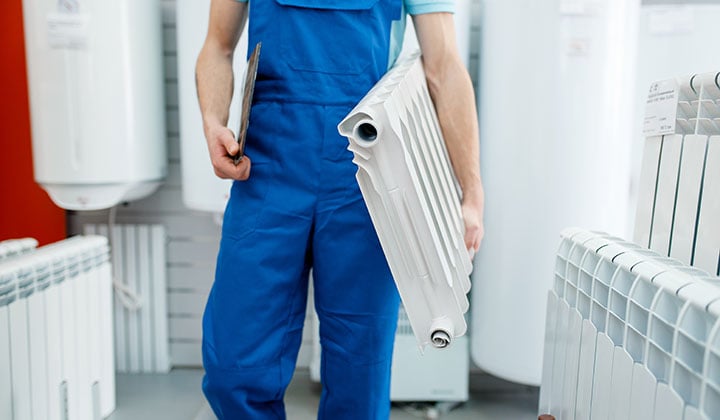
With a big shake-up well underway for how we heat homes, more homeowners are exploring different ways to heat their homes in a more cost-effective and sustainable way. One question that often crops up is ‘Are electric radiators better than central heating?’. This really depends on many different factors which we will break down in this heating blog.
These include:
There are three main types of electric radiators. These are: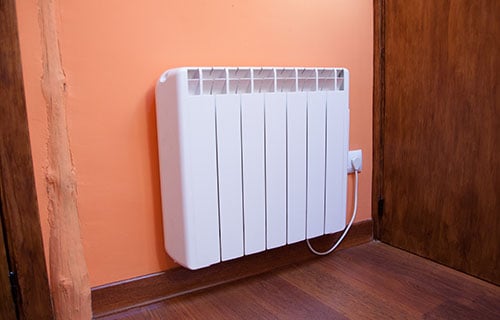
Dry Element (Dry Thermal)
This type of electric radiator provides fast, efficient, consistent heat that can be easily controlled. They tend to be lighter and therefore more portable than other electric radiator types.
A dry thermal electric radiator works by drawing electrical energy from a dry thermal element which heats up on demand and transmits warmth around the room using convection.

Oil Filled
Oil filled radiators are not too dissimilar to central heating because both use heated liquid to transfer heat to the surface of the radiator. The real difference is that oil filled radiators are not reliant on an interconnected system of pipes because they use their own heating element.
The electrical element is fully submerged within the oil (thermal fluid), so that when it heats up, all the heat energy created is transferred to the surrounding oil which in turn warms the chassis. Therefore, spaces are heated by using a combination of convection (heating the air around them) and radiant heat.
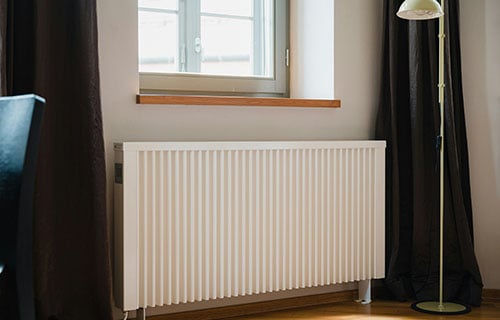
Ceramic Core
Ceramic core radiators work by passing electrical current through a ceramic plate to produce heat. Similar to oil-filled radiators, the heat from the ceramic core is conducted by the body of the radiator and is then transferred to the surrounding air which warms the room.
You’ll find that there are some ceramic radiator models that have a fan built in which improves how the heat is directionally dispersed and used more effectively. The only drawback to this is that the unit is much noisier than models without a fan included.

Electric radiators
Electric radiators are 100% efficient at point of use, meaning every Joule of energy you pay for is converted to heat which helps to save energy and reduce running costs.
Another advantage is with electric radiators they only heat the rooms they’re in, so you’ll be able to easily create heating zones easily. For example, you may only want the heating on in a spare bedroom only when you have guests staying. This means that you aren’t wasting energy and spending money on heating rooms in your home that aren’t being used.
Traditional Central Heating
Traditional central heating systems, which use gas, waste energy through the network of pipes that transports the warm water to each radiator. As water travels through the house to each radiator, heat loss will occur from the pipework into the walls. This results in traditional central heating being between 80%-90% efficient.
Additionally, with a traditional gas central heating system you need the whole system on to use a single radiator. So, get ready to run around your home and turn down the radiators you don’t often use! Alternatively, fit smart thermostats to each radiator which you can control via an app.
Electric radiators
Currently, the average cost per unit of electricity (24.50p) is more expensive than per unit of gas (6.04p). However, electric radiators provide more opportunity to manage your heating more cost-effectively.
Being able to accurately control and programme your electric radiator is a must have to ensure energy efficiency is maintained and your heating bills don’t go through the roof. Electric radiators with inbuilt digital thermostats are known for accuracy. Looking at the technical specification of an electric radiator you’ll find information on the thermostat’s accuracy. For example, ‘accurate to +0.3oC’ or ‘accurate to +0.8oC’. The lower the number, the more accurate the thermostat.
Also, when it comes to running costs, electric radiators work hand and glove with renewable energy such as that created by solar panels on your roof. This means you’ll pay nothing or very little depending on the heating demand of the property.
Traditional Central Heating
On face value, gas looks extremely tempting due to the lower cost per unit of gas compared with electricity. However, it’s worth remembering that not only is this type of system less efficient, but there are also maintenance costs to consider too such as the annual boiler service. There are annual plans you can pay monthly such HomePlan from Corgi which is roughly £20 per month which will include the annual service. If you don’t have this type of policy you can expect to pay, on average, around £210 for a single boiler repair or about £200 to replace an existing radiator.
Electric radiators
Electric radiators are incredibly easy to install. You don’t need an electrician if you are not wiring directly to the mains. Many models also come with the option to either install on the interior wall or use as a free-standing heat source.
Traditional Central Heating
One of the biggest expenses when fitting a new central heating system is going to be the gas boiler. A good boiler can cost in the region of £1,500 – £1,750 (excluding labour) depending on the specification you decide to choose. For a standard central heating radiator, £750 – £850 (which includes labour) for 6/7 radiators is to be expected.
The British Thermal Unit (BTU) is the most common measure of the heat a radiator with emit into the room. If it’s too low, the room will not reach the desired temperature and if too high, you’ll end up overheating the room.
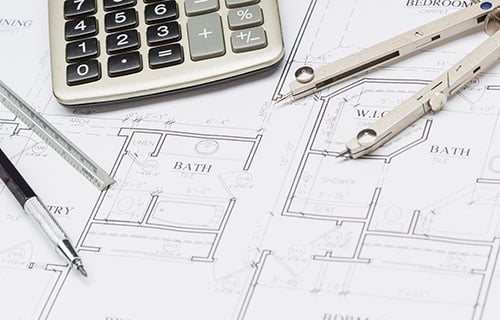
To calculate the BTU you will need to measure the length, width and height of the room as well as taking into consideration windows and patio doors.
If you do know the output (watts) of the radiator you want to install, multiply that by 3.41 to get the BTU/hr. If you have the BTU, you can divide it by 3.41 to get the watts or output of the electric radiator you need.
Here’s a working example:
An electric radiator with an output of 500W will have a BTU/hr would be 1,705:
500(W) x 3.41 = 1,705 (BTU/hr)
You’ll find some free BTU calculators on the we such as the B&Q BTU calculator.
'Are electric radiators better than central heating?’ This really depends on the project type and how you plan to use them. A key consideration is not to overload your circuit. For a retro fit project where you are looking to overhaul your entire heating system by replacing your gas central heating with electric, we would always recommend seeking advice from a qualified electrician. To reduce overloading, the electrician may need to wire your electric radiators into fuse spurs, especially if you are planning to use multiple electric radiators to replace a traditional gas heating system.
If you have any questions about what’s been covered in this heating blog article, please contact us via the website or give one of the team a call on 0800 019 5899.
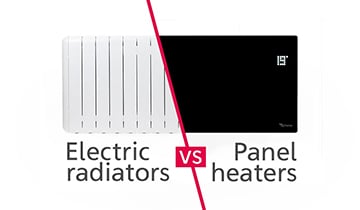
5 min read
In this blog we run through the difference between electric radiators and panel heaters. If you are thinking about giving your home heating a bit of...
.jpg)
8 min read
Electric heating has been on the march for a while now, but in 2025 it’s no longer the quirky alternative—it’s mainstream. More and more homeowners...

5 min read
If you are considering electric radiators as a heating option for your renovation or new build project, then you’re probably thinking about what is...